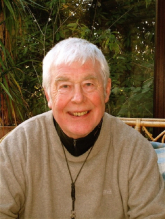
Geoff was born on 15th February 1941 and died on Easter Monday 18th April 2022. His funeral will be held on Saturday 21st May in Cornwall. If you would like to attend please contact Willie Wilson for details.
Geoff was a tall man with a craggy face but gentle with it. His main interest for much of his academic life was in fish behaviour and he was a pioneer in the research community for the use of scuba diving to make observations of fish in their natural habitat. Paul Hart has memories of him describing, with great enthusiasm, how he had been observing the behaviour of whiting off the Plymouth breakwater. One of the main groups of fish that Geoff worked on were the wrasses and he did much to elucidate the intricacies of their mating and cleaning behaviours. Geoff was a brilliant artist and illustrated his ideas and findings with his own drawings. Keith Hiscock noted that he did fascinating work on corkwing wrasse whilst at the MBA. In addition Geoff had prepared a report for the Nature Conservancy Council on rare marine fish.
It was through fish behaviour work that Paul Hart came to know Geoff. When Paul joined Leicester University in 1976, he applied to NERC for a research grant to study pike predation. Geoff was on the committee that assessed the grant. As a result of this he contacted Paul and encouraged his efforts. On subsequent visits to Plymouth as an external examiner for a degree stream at the then Plymouth Polytechnic, Paul would call in at the MBA for a chat with Geoff. Later, when Plymouth Polytechnic had become Plymouth University and Paul was again an external examiner for their fisheries degree, Paul was invited by Geoff to stay with him, his then wife Sally and his three sons at their house in Harrowbarrow, Callington, Cornwall.
Geoff was an active member of the Fisheries Society of the British Isles (FSBI) and was a Council member in the mid to late 1990s. Geoff also convened together with Robert Wootton the 1982 summer symposium held at Plymouth Polytechnic. At that time, the proceedings were published as a book and Geoff and Robert edited Fish Reproduction: Strategies and Tactics (1984) Academic Press. Geoff also put a case for the Society to give the MBA £5000 to assist with the improvement of the public aquarium which was housed on the ground floor of the MBA Citadel Hill Laboratory. Geoff was the staff member who oversaw the running the aquarium and he was very aware of the limitations of this Victorian construct with its small tanks and limited space.
One of Geoff’s many innovations, helped by Silja Swaby, was to start an online database which was designed to include the biological characteristics and ecology of marine species with the ultimate aim of including all UK species. This was transformed by later contributors into the Marine Life Information Network or MarLIN which is now well-established at the MBA and a well-used source of information for scientists in all countries.
Geoff was one of the early advocates of the need for marine conservation (signing a memo from 21 scientists to NERC in 1965 when he was at Queen Mary College just before becoming a MBA Fellow. He went-on to contribute as a part of a small group (about six) to developing what became Underwater Conservation Year and on to the Underwater then Marine Conservation Society (a group that Keith Hiscock was also part of).
Geoff’s greatest achievement was the design and creation of the National Marine Aquarium in Plymouth which recently celebrated its 20th anniversary, now part of the Ocean Conservation Trust. Geoff had the idea, and supported by the then Director of the MBA, Mike Whitfield, developed the design together with architects to realise a truly world class aquarium. Mike Whitfield notes that he admired Geoff’s creativity, perseverance and no nonsense approach. He was the undoubted (and undoubting!) driving force behind the realisation of his vision for a National Marine Aquarium in Plymouth. Geoff’s singlemindedness was an essential ingredient of a successful fund raising and attention rousing campaign. £20-million had to be raised but towards the end of the project there was a shortfall which required a bank loan to bring the project to a conclusion.
Geoff had expected to be the Director of his creation, which was to be more than just a set of tanks displaying marine organisms to tourists, but also a tool for education and research, but the bank had other ideas and required as a condition of the loan that the Director should be someone from commerce. As a result, Geoff resigned and soon retired to Cornwall to work on fish conservation for the Countryside Council for Wales, and a host of personal projects.
Geoff will be missed by all who knew this brilliant and talented man, who did so much in helping make marine biology in the UK what it is today.
Paul J B Hart (MBA Trustee), Leicester, May 2022